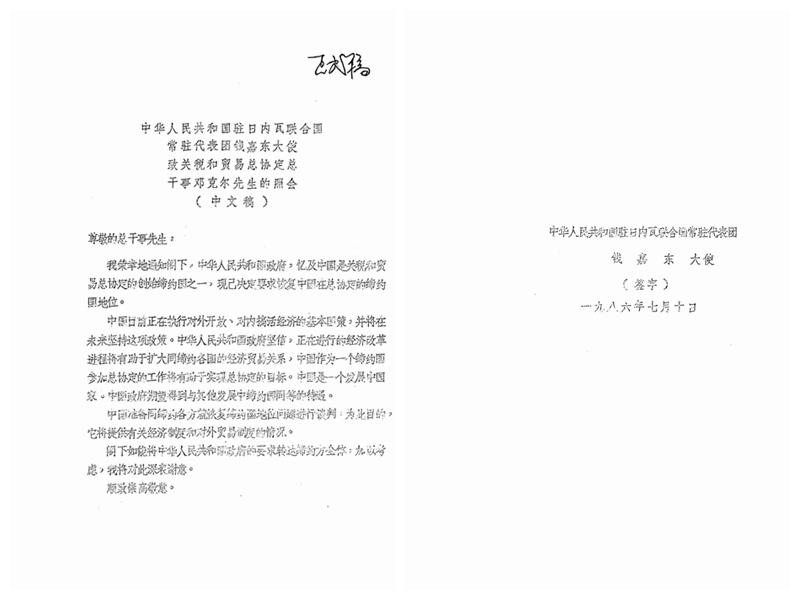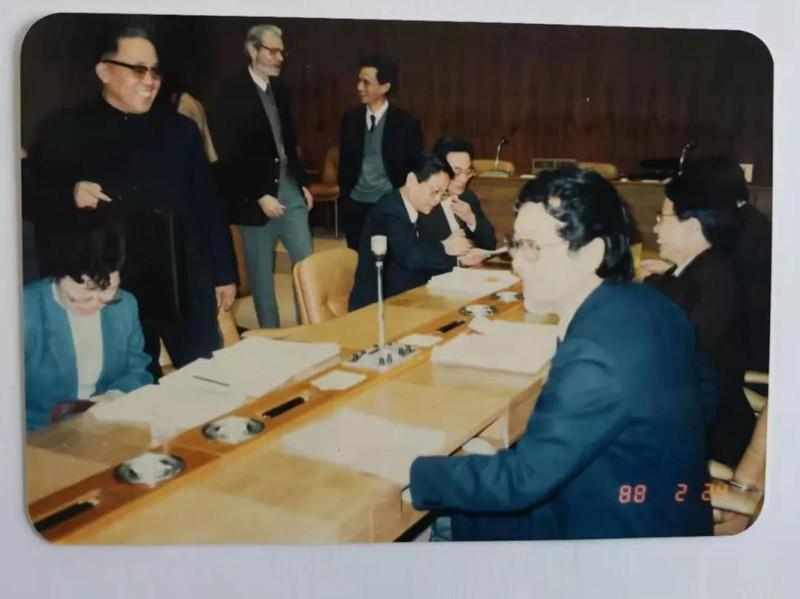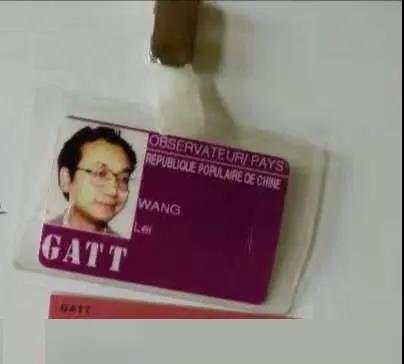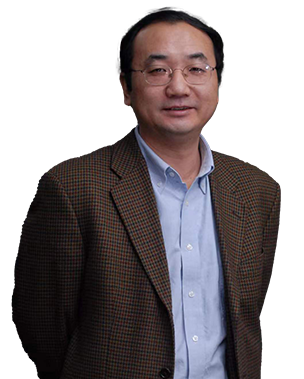A Legal Person and the Past of WTO (1)
During the fifteen years from 1986 to 2001, after arduous negotiations, China joined the World Trade Organization. Wang Lei, a lawyer from Gaopeng Law Firm, participated fully and deeply in the negotiation from the beginning, and was a legal person in the negotiation delegation. This year marks the 20th anniversary of China's accession to the WTO. Gao Pengsuo specially invited Lawyer Wang to write a series of articles to recall the details of those eventful years. We also take this opportunity to pay tribute to those who stood at the forefront of reform and opening up and worked hard in the negotiations for the national interests.
This year, 2021, marks the 20th anniversary of China's accession to the World Trade Organization.
35 years ago, in 1986, China began negotiations to restore its seat in the General Agreement on Tariffs and Trade (GATT) and subsequently join the WTO; In the same year, the Uruguay Round negotiations, which directly led to the establishment of the WTO, were fully opened, and China was invited to participate fully.
In the same year, I graduated from Peking University as a graduate student and came to work in the Second Division of the Foreign Trade Department, which specializes in these two negotiation matters. As a fledgling legal person, I was fortunate to have participated in the negotiations from the beginning.
Time flies, and old events unfold. As an experienced person, looking back on the past, the experience reappears. On the occasion of the anniversary, select a few fragments and put them into writing to record them.
35 years ago, the Chinese government submitted an application to the General Agreement on Tariffs and Trade (GATT, the predecessor of the WTO) for restoration of seats. The world was shaken by it.

Application for Restoration of GATT Seats Submitted by China

China's Application for Restoring GATT Seats (Chinese)
The General Agreement on Tariffs and Trade (GATT) has always been nicknamed "The Rich Club", which is neither praised nor belittled. In order to revive the world economy after World War II, major countries deliberated and negotiated to reduce their tariffs and open their markets, resulting in the birth of the General Agreement on Tariffs and Trade (GATT). Its members are mainly industrialized and developed countries, hence the nickname. When China, as a big player, applies for membership in the club, all parties naturally have speculation and expectations about what changes will happen to the club, and they will all wait and see.
China has come prepared for its needs.
The biggest attraction of the General Agreement is that members automatically grant each other the most preferential treatment in terms of tariffs and terms of trade (in jargon, "most favored nation treatment"). "China signs trade agreements with major trading countries one by one and gives each other preferential treatment, which is of course not as convenient as joining the General Agreement and immediately obtaining preferential treatment from all members.". With the reform and opening up, China needs more trade preferences to gain a larger trade market. As early as the beginning of reform and opening up, China has been focusing on entering the final important international organization, the General Agreement. For this reason, the Ministry of Foreign Trade organized a delegation to investigate some members of the General Agreement, especially several Eastern European countries and developing countries similar to China. Due to the long-standing exclusion of this wealthy club, there has been little substantive research on the GATT in China. The Ministry of Foreign Trade sent officials to the General Agreement to participate in training courses, and invited senior officials of the General Agreement to come to China for consultation and teaching. Of course, for participating in the General Agreement, the government has conducted sufficient internal argumentation and pre judgment.
In terms of the General Agreement, each member was currently contemplating launching a new round of negotiations that would further reduce tariffs and open up each other's markets. If China enters the negotiations of the General Agreement, can parallel with the new round of its own negotiations, and becomes a member before or at the end of the negotiations, China will instantly enjoy the results of the negotiations. The members of the General Agreement have made a clear offer to China about this, and in their draft negotiating declaration, they explicitly grant China the status of a "full participant" in the upcoming round of negotiations.
The time has come.
On July 10, 1986, Chinese Ambassador Extraordinary and Plenipotentiary to Geneva, Qian Jiadong, submitted an application for China's resumption of the General Agreement on Tariffs and Trade to the then Director General of GATT, the Swiss Dunkel, and officially opened negotiations. Ambassador Qian had already passed his 60s and was a veteran diplomat with countless experiences. However, perhaps he could not have expected that after he played his first goal on the field, the negotiation ended up lasting for 15 years, winning the runner-up for the longest negotiation time in history (the championship was won by Russia, the negotiation was held in 1993, and he joined in 2012). After submitting the application, Ambassador Qian flew to Uruguay, a small South American country with no diplomatic relations at the time, as the representative of China as a "full participant". Once again, Ambassador Qian opened a comprehensive participation for China in the later widely known "Uruguay Round of Multilateral Trade Negotiations".
In that year, Chinese Ambassador Extraordinary and Plenipotentiary Qian Jiadong, on behalf of China, launched the long march of two negotiations in the General Agreement. History must be written and recorded.

The Chinese delegation to the GATC Hall arrived early. The person holding the tie is Ambassador Qian Jiadong, on the right is the first negotiator, Vice Minister Shen Juoren, and on the other side is Ms. Zhang Yuejiao.

The Chinese representative entering and exiting the customs and trade building has a deep purple badge with an observer written on the top. At that time, the official members' badges were blue.
Ambassador Qian is the most elegant professional diplomat I have ever seen, with a soft exterior and a hard interior, loyal to his duties. No wonder he was Premier Zhou's foreign affairs secretary and China's first disarmament ambassador. Like most talented scholars from the south of the Yangtze River, he has a beautiful figure, wears rimmed glasses with circular lenses that resemble those produced in the Republic of China during the period of the People's Republic of China, and wears a Hongdu suit made by the Hongdu Suit Store in Dongjiao Minxiang, Beijing (the designated suit for diplomats at that time). He wears a smile on any occasion, and has an elegant manner. It's hard to imagine what it would be like if he were ordered to protest and get angry. Ambassador Qian spoke Wu Nong Mandarin with a slow and gentle voice. However, in the General Agreement Council Hall, when it was China's turn to speak, Ambassador Qian always raised his voice significantly, as if to shake off the microphone in front of him, so that everyone could hear China's voice clearly. Ambassadors in Geneva are no better than ambassadors stationed in a country, because the target audience of ambassadors is not the host country, but the counterparts of ambassadors from various countries. In Geneva, the ambassador's personal knowledge, eloquence, charisma, and style of conduct are far more intuitive and authentic than the country he represents. Geneva is the seat of many international organizations. Ambassadors from various countries in Geneva shuttle through the conference halls of various international organizations during the day, listening to, speaking, negotiating, and participating in various receptions at dusk. Ambassadors from various countries have met and interacted so frequently, forming the diplomatic circle in Geneva. Ambassadors describe their circle as a faculty in a university, and the highly respected ambassador of a certain country is often considered a dean. Ambassador Qian is such a department head. Although China was not a member of the General Agreement at that time and was unable to participate deeply in the affairs of the General Agreement, Ambassador Qian always talked and laughed freely when he came to the General Agreement conference hall, and was the focus of attention. On the one hand, this is due to the ardent expectations of representatives from various countries for China's negotiation and membership, and on the other hand, it is also due to Ambassador Qian's personal charm. After many years, Ambassador Qian returned to China and retired. The Swiss Ambassador who worked with him for many years during the negotiations, as well as the Chairman of the China Working Group, Gillard, made a special visit to Ambassador Qian during his visit to China. "Jiadong" Gillard is so affectionately calling Ambassador Qian.
35 years ago, Ambassador Qian Jiadong opened the curtain on China's entry into the General Agreement on Tariffs and Trade (GATT) in such a grand and harmonious diplomatic atmosphere. Thereafter, there are a series of admission procedures and issues. Why should China restore its seat? What price is China going to pay for admission to this club? What unexpected and unexpected problems will be encountered during the membership process and how to deal with them?
To be continued.
(This article is translated by software translator for reference only.)
Related recommendations
- Tax lawyers review the draft of the revised Tax Collection and Administration Law for soliciting opinions
- New Measures for Punishing "Dishonesty" by the Supreme People's Court at the Two Sessions in 2025 (Part 3): "Height Limit" Single Release Mechanism
- New Measures for Punishing "Dishonesty" by the Supreme People's Court at the Two Sessions in 2025 (Part 2): Grace Period System
- Interpretation of the Management Measures for Compliance Audit of Personal Information Protection - Feeling the Rhythm and Rhythm of Regulatory Flow



